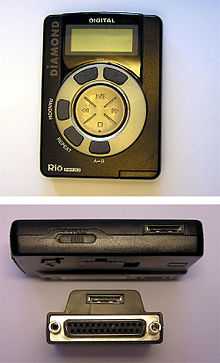Rio PMP300

The Rio PMP300 was a portable consumer MP3 digital audio player (portable digital audio player), and was produced by Diamond Multimedia. It was introduced September 15, 1998,[1] and it shipped later that year.
Features
Roughly the dimensions of a deck of cards (3.5 inches by 2.5 inches and 0.625 inches thick), the Rio was black and had an LCD screen and a circular pad with control buttons. It had controls for skipping tracks forwards or backwards, repeat, random play and for four preset equalizer settings. The LCD displayed the track number being played, but did not display artist or title information. It could play MP2 and MP3 format audio files, and had support for a variety of bit-rates, including MP3 variable-bitrate (VBR) support.
It shipped with 32 MB of internal memory and had a SmartMedia slot, allowing users to add additional memory. It was powered by a single AA battery which provided between 8 and 12 hours of playback time. Connection to a personal computer was through the computer's parallel port, with a proprietary connector on the Rio's edge.
The Rio retailed for US $200 with the ability to hold around 30 minutes of music at a bitrate of 128 kbit/s. An upgraded version was later released, which was colored translucent green and equipped with a larger 64 MB internal memory, at a cost of $250. The Rio also spawned one of the first Digital Music service providers (ASP or SaaS Cloud Service), RioPort. RioPort was the first digital music service to license secure, single-track commercial downloads from major record labels.[2]
Diamond no longer provides support for the Rio, and the last version of Microsoft Windows to work with Diamond's Rio software was Windows 98. Consequently, owners wanting to keep their Rio working use independently produced freeware programs such as "Dreaming of Brazil" or "RIOsitude" to upload audio files to the player. Similarly, limited Linux command-line based support for the Rio is provided by the rioutils package.
Design flaws
The Rio PMP300 suffered from a few notable design flaws. The battery compartment door flap was notorious for breakages—a fairly common occurrence. The battery cover was difficult to repair due to the stress caused by the spring-loaded battery compartment and the fragile plastic used for the door clips. The metal hinge used to hold the compartment to the base of the unit would also put strain on the plastic casing causing cracks around the SmartMedia slot. Furthermore the silver coating applied to the main central control button in the original 32 MB unit would often peel and flake off with use. The control disc would commonly fall off.
Supplied Software
The Rio PMP300 was supplied with a copy of Music Match for managing the user's MP3 library. A selection of folk/country/blues MP3s were also provided, the metadata for which was in a Music Match specific format rather than as ID3 tags. The metadata did include, however, lyrics and band biographies. The included tracks were:
- Albert Einstein Dreams - Naked to the World
- Coastin' - Bill Mize
- Dance Again - Terri Allard
- Heartland - Jack Williams
- I'm Not Lost I'm Exploring - Jana Stanfield
- King of the Brooklyn Delta - David Hamburger
- On the River Road - Karen Savoca & The Mind's Eye
- Pouring Rain - Mike Rayburn
- Take No Prisoners - Janis Ian
- Vertigo - Adam+Kris
Legal significance
On October 8, 1998, the American recording industry group, the Recording Industry Association of America, filed an application for a Temporary Restraining Order to prevent the sale of the Rio player in the Central District Court of California, claiming the player violated the 1992 Audio Home Recording Act. See RIAA v. Diamond Multimedia.
Judge Andrea Collins issued the temporary order on October 16, but required the RIAA to post a $500,000 bond that would be used to compensate Diamond for damages incurred in the delay if Diamond eventually prevailed in court. Diamond then announced that it would temporarily delay shipment of the Rio.
On October 26, Judge Collins denied the RIAA's application.[3] [4] On appeal, the Ninth Circuit held that the Rio's space shifting was fair use and not a copyright infringement.[5]
After the lawsuit ended, Diamond sold 200,000 players.[6]
See also
- Rio (digital audio players)
- Eiger Labs MPMan F10 – the first portable MP3 player
References
- ↑ Portable MP3 Player Announced - Harmony Central
- ↑ King, Brad (April 4, 2001). "MTV Gets Down with Downloads". Wired.com. Retrieved 2010-01-10.
- ↑ Starrett, Robert A. (Jan 1999). "RIAA loses bid for injunction to stop sale of Diamond Multimedia RIO MP3 Player; appeal pending". Emedia Professional. Retrieved 2009-03-10.
- ↑ Clampet, Elizabeth (June 16, 1999). "Court OKs Diamond Rio MP3 Player". InternetNews.com. Retrieved 2009-03-10.
- ↑ RIAA v. Diamond Multimedia, 180 F.3d 1072 (9th Cir. 1999).
- ↑ Knopper, Steve (2009). Appetite for Self-Destruction. New York: Free Press. p. 166. ISBN 1-4165-5215-4.
External links
- A review of Rio PMP300 at The Adrenaline Vault
- Original Rio PMP300 product page, from Archive.org, mentioning two of the first digital music services: Goodnoise and MP3.com